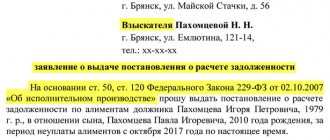Collecting arrears of alimony is not a simple matter. Many people are concerned about how to collect alimony debt.
The court, bailiffs, and a lawyer come to the rescue, whose competence includes extremely important family issues - the collection of alimony for minor children. Our debt collection lawyer will help you achieve alimony in the fight against the debtor.
Procedure for collecting alimony debt
The reasons for the formation of alimony debt in most cases are:
- evasion of payments with intent;
- the debtor's inability to make timely payments;
- accounting error in the process of deduction from monthly earnings;
- the recipient of alimony does not report his location or refuses transfers.
Debt, in this case, is understood as the amount of alimony obligations that should have been paid by agreement, court decision or court order. As a general rule, debt is subject to collection by the SSP service for 3 years preceding the application. After the initiation of proceedings, the SSP official calculates the debt.
If the debtor (or claimant) does not agree with the above calculation, the said decision may be appealed to a higher authority or court. If you disagree with the procedure for calculating the debt, you can appeal the bailiff's decision in the order of subordination (file an administrative complaint), as well as challenge it in court.
So, your actions in case of non-payment of alimony should consist of the following points:
Contacting the bailiff service with an application to determine the amount of debt and its collection. In this case, the service issues a corresponding decision.
If you disagree with the resolution (amount of debt, unaccounted income, etc.) mentioned in the first paragraph, contact the court or a higher authority (in the order of subordination) and appeal the specified non-normative act.
If the debtor belongs to the category of “malicious” defaulters, he may be brought to criminal liability.
To whom, from whom, and how much
To begin with, we will determine which categories of citizens and on what grounds can expect to receive alimony and from whom. These issues are regulated by Section V of the Family Code of the Russian Federation.
The first reason: blood relationship. The category of blood relatives includes:
- parents;
- children;
- brothers and sisters;
- grandparents;
- grandchildren.
Category two: family ties. This category includes:
- spouses (and in some cases ex-spouses);
- adopted children;
- adoptive parents are adults.
Alimony relations may arise between all these relatives. They are regulated by the same Family Code and protect the rights of both alimony recipients and alimony recipients.
But in order for rights to be protected, the relationship must be properly formalized. There are several ways to do this.
Firstly, you can enter into a voluntary alimony agreement. The contracting parties can conclude it in simple written form or even orally. You just have to remember that such an agreement will not have any force other than “the word of an honest merchant.”
This is a very common story: on the one hand, after some time the husband may “forget” about his promises to pay a certain amount for child support. On the other hand, the wife, who previously regularly received transfers from her ex-husband, may suddenly sue.
And then they claim that there were no payments or that there were, but much less than what was discussed. In this situation, all participants in the transaction are at risk.
Therefore, even if the issue is resolved amicably, it is necessary to register the agreement with a notary. In this case, the parties have certain guarantees against sudden amnesia of the other half.
If the alimony provider stops paying the agreed money, the alimony recipient can go with a notarized agreement to the bailiffs for forced collection.
And also to work for a defaulter, so that alimony is withheld from his salary. Neither the bailiffs nor the employer's accounting department have the right to refuse to accept such a document.
But before going to the notary’s office, the parties need to discuss various details of the agreement: from the dates of the transfers to their size.
For better preparation, of course, it is highly advisable to hire a specialist who will help plan everything. Moreover, it will be impossible to change the terms of such an agreement unilaterally later. For any adjustments, a new notarial agreement will need to be drawn up.
The second method of collecting alimony is forced. That is, through the court. One of the parties files a claim, the parties voice the terms, present evidence in their favor, and the court makes a decision. Harsh, but fair.
Claim for collection of arrears of alimony
An application for collection of alimony arrears (in case of disagreement with the amount of arrears) must contain information about what circumstances were not taken into account by the SSP official when making the decision, as well as provide the correct calculation. The application itself is considered by a magistrate, according to territoriality.
If the dispute is not related to the amount of debt, you can go to court in accordance with the administrative procedure provided for by the CAS of the Russian Federation.
The statement of claim must contain the following information:
- The court where the application is filed;
- Full name, address of the plaintiff;
- Full name, address of the defendant;
- Amount of claims;
- Information about the reasons, period of debt formation, previously issued judicial acts, decisions of the BSC, concluded agreements, etc.
- Calculation of what you think is the correct debt;
- In the pleading part - ask to collect the debt;
- Appendix – documents on which you base your requirements (in accordance with Article 132 of the Code of Civil Procedure of the Russian Federation).
The specified application is not subject to state duty, in accordance with subparagraph 2 of paragraph 1 of Art. 333.36 Tax Code of the Russian Federation.
IMPORTANT : the application can be submitted either electronically or on paper.
If you file an administrative application, send it to the district court. The period for filing an appeal is 10 days from the moment you learn that your rights have been violated (if you appeal the actions of the SSP employee). The application form is similar to the application submitted under the Code of Civil Procedure of the Russian Federation.
If the defendant is the SSP, then in the petition part it is necessary to indicate: “I ask that the decision of the SSP No., date be declared illegal, and that the violations be eliminated by recalculating the amount of the debt.
The list of documents attached to the application is provided for in Part 1 of Article 126, Part 3 of Article 220 of the CAS of the Russian Federation. The claim itself is sent to the court at the location of the defendant and can be filed either electronically or on paper.
USEFUL: more tips on filing a claim in court - watch the VIDEO
The procedure for appealing a decision on the calculation of alimony debts
Alimony is cash or in-kind assistance to a close relative, provided at a certain frequency and in a set amount. Parents and children have equal rights to receive alimony; this norm is determined by current legislation.
In practice, there are very often cases when the debtor does not fulfill alimony obligations and arrears begin to form. Here are just a few of the main reasons for the formation and growth of alimony debts: Among the potential reasons for appealing the amount of alimony debt, the following can be identified: In this situation, the claimant files a complaint with a substantiation of the position and the attachment of evidentiary documents.
For example, an official certificate from Rosstat, the employment center, or a local government body can confirm the size of the subsistence minimum. The defaulter can file an appeal against the bailiff's decision if the current life situation does not allow him to repay the calculated amount of the debt.
Such circumstances include the following: Let us list the mandatory details of the application: How to receive child support will be discussed in the video: Attention!
Due to recent changes in legislation, the legal information in this article may be out of date!
Our lawyer can advise you free of charge - write your question in the form below:
Deadline for calculating alimony debt
If the debt arose for the first two reasons, i.e. due to the fault of the payer, the limitation period does not apply. It is possible to submit a statement of claim to the payer for the collection of arrears of alimony for the 3-year period before applying to the courts.
Debt can be calculated in several ways, which are chosen depending on the form of payments and the debtor’s willingness to contact the bailiffs. For example, if the payment of alimony is assigned as a share of the debtor’s monthly income, then information about the amount of salary and sources of income is taken as the basis for the calculation. If they are not presented, the calculation is carried out by bailiffs, taking into account the average wage in the country.
Peaceful settlement of alimony debt
If, during a divorce, the parents entered into an agreement on voluntary financial participation in the life of the child, then the situation develops in brighter colors. But even here, difficulties may arise with the payment of alimony by one of the former spouses.
In this case, collection occurs on the basis of a drawn up agreement, but with the help of regulatory authorities. Most often, the settlement agreement on providing support to the heir is observed impeccably, because already at the stage of forming the document it was based on voluntary principles.
In the agreement itself, parents indicate the following information:
- the amount of money to be transferred monthly to the child’s account (also find out how to collect child support after 18 by following the link);
- terms of payment of alimony;
- procedure for making monthly payments.
ATTENTION : watch our video on the issue of alimony and subscribe to the YouTube channel
How to start the process
The procedure for challenging alimony in a fixed amount of money The amount of the debt is determined by the bailiff. As a result, he makes a decision, after which the payer performs one of the following actions.
- He gets acquainted with the document, and if he disagrees, within a certain period of time, files a complaint to reduce the debt.
- Files a claim for debt relief.
- Agrees with the resolution and pays the established debt.
- dismissal from work;
- onset of disability;
- onset of disability;
- transfer at work with a reduction in pay;
- retirement;
- the occurrence of other costs for the new payer’s family.
Judicial procedure for collecting alimony debt
If amicable and peaceful agreements in the family are not reached, the procedure, terms and amount of payments are established by the court - the process begins on the issue of collecting arrears of alimony. Take into account:
- financial status of both parents;
- the presence of “burdens” in the form of guardianship of disabled people, the presence of other minor children, the incapacity of one of the spouses and caring for elderly incapacitated persons;
- the lawyer checks the evidence presented by the second party, since the certificates provided about the amount of income may not correspond to reality and reduce the amount of arrears for alimony obligations;
To protect the interests of minors in court, interested parties resort to the help of professional lawyers.
ATTENTION: our lawyer is ready, guided by all legal means, to seek for you the collection of arrears of alimony in court.
Reasons for changing the amount of payments
The court will consider the following reasons:
- a sharp and irreparable deterioration in the financial well-being of the payer;
- the appearance of new children in another family;
- the need to support disabled parents or other relatives;
- the child’s entrepreneurial activity, which partially pays for his needs and expenses;
- private property held by a minor that generates income through rental.
In relation to debt, significant circumstances will be:
- failure to fulfill the duties of care and education by a stepfather or stepmother;
- disability of the second spouse caused by alcohol addiction;
- short period of marriage between the parties;
- criminal or improper behavior of the recipient.







